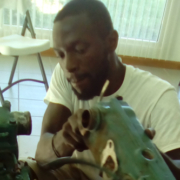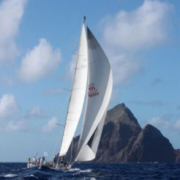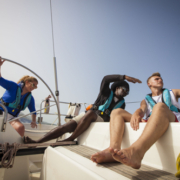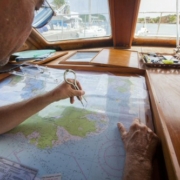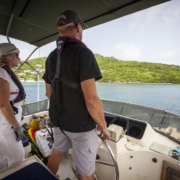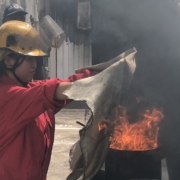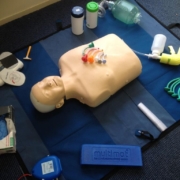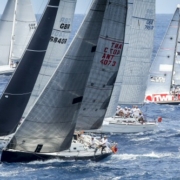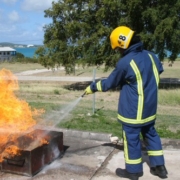We currently offer the STCW Elementary First Aid and are now happy to be able to also offer the MCA MFAS [Medical First Aid] and MCAS Medical Care Aboard ship] courses along with the Refresher in 2026.
Please contact [email protected] for further details.
In association with Centaur Training:
Sue Johnson has worked as a full time first aid and medical instructor for over ten years. Prior to this, she held a variety of clinical and community posts within the NHS including health promotion, project management and training delivery at both local and regional levels.
She is a Registered Nurse, Midwife and Health Visitor with post graduate qualifications and experience in accident and emergency nursing, remote emergency first aid and also recognised MCA qualifications in first aid and medical care. She is also an approved MCA instructor.
Sue's extensive training delivery and experience has encompassed immensely varied student groups and backgrounds including the maritime and super yacht industry, Ministry of Defence and multi-national companies both in the UK and abroad. This, combined with her yachting experience, has enabled her to develop high quality, flexible courses that are tailored to the specific needs of any particular group incorporating current clinical practices and knowledge. Delivered in a relaxed and highly professional manner.
MEDICAL FIRST AID ABOARD SHIP (MFAS)
4 days duration - $895usd
Scene assessment and management.
Immediate assessment and management of casualty including if unconscious.
Procedures for obtaining emergency help and Telemed assistance.
Documentation and record keeping.
Maintenance of airway, breathing and circulation in casualty requiring resuscitation, including use of defibrillator.
Identification and management of :
Shock.
Bleeding (internal and external).
Types of wounds including use of appropriate dressings.
Temperature extremes (hypo and hyperthermia).
Common types of burns including determining severity.
Spinal and musculo-skeletal injuries (fractures and soft tissue).
Head, chest and abdominal injuries including monitoring.
Choking.
Poisoning.
Medical emergencies :
Heart attack, asthma, hypo and hyper glycaemia.
Anaphylaxis, seizures.
Stroke.
Maintaining hygiene and preventing cross infection.
Familiarisation and use of the first aid kit.
Use of the first aid kit in the practical exercises.
PROFICIENCY IN MEDICAL CARE ABOARD SHIP (MCAS) ($995usd)and MEDICAL CARE REFRESHER ($795usd)
5 and 3 day duration respectively.
Assessment and care of an ill or seriously injured patient at sea including recording :
Temperature.
Pulse.
Blood pressure.
Respiratory rate.
Blood oxygen saturation.
Conscious level.
Urinalysis.
Blood glucose level.
Procedures for obtaining emergency help and Telemed assistance including documentation and record keeping.
Extended management of airway, breathing and circulation in patient requiring resuscitation including use of oxygen and additional airway support.
Identification, management and examination of patients with medical conditions and emergencies :
Cardio vascular.
Respiratory.
Urinary.
Gastro intestinal.
Gynaecological.
Dental – ear, nose and throat.
Opthalmic.
Communicable diseases and sexually transmitted infections.
Use of medicines in the medical kit including storage, administration and record keeping and management of controlled medicines.
Assessment of pain level and use of multifaceted approach to pain relief.
Management of a seriously ill or injured patient on board who requires continuous observation, monitoring and nursing care.
Practical sessions of clinical procedures :
Wound closure – suturing, gluing, stapling and adhesive strips including practice in local anaesthetic administration.
Urinary catheterisation (male and female).
Preparation and administration of subcutaneous and intra muscular injections.
Preparation for intravenous and intra osseous cannulation including giving sets and cannula insertion.
Recognition and management of infection on board including methods of prevention, monitoring and control and liaison with relevant port authorities.
Management of death at sea.
Management of childbirth at sea.
STCW Elementary First Aid
The Elementary First Aid course module combines theory and practical training for basic first aid and lifesaving skills. The course aims to provide an introduction to the principles of first aid and details how to respond to common medical emergencies. It also meets the requirements for those requiring updates
Subjects covered in this module include:
Types of accidents and emergencies on board that may require first aid.
Methods of raising the alarm.
Immediate actions when accidents or medical emergencies occur.
Minimising risk of further harm.
Body structure and functions.
Emergency first aid equipment and its use.
Priorities of treatment (Triage).
Casualty positioning and transportation.
Basic Life Support (CPR).
Shock management.
Bandaging.
Wounds/Bleeding.
Burns/Scalds.
On successful completion of this course the student will receive an MCA approved STCW certificate in Elementary First Aid (STCW Regulation A-VI/1-3).
$250usd pp. Please click on the 'Training Dates & Booking' button on the right to check available dates.

